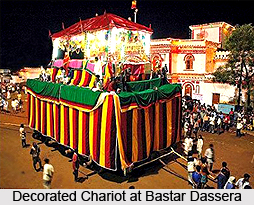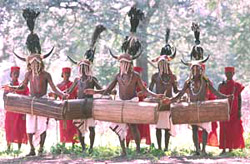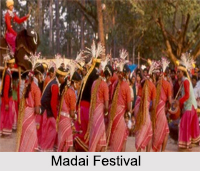Holy Week is in Christianity the week from Palm Sunday (also called Passion Sunday) through Maundy Thursday, Good Friday and then Holy Saturday, leading to Easter Sunday. Purpose of Holy Week is to re-enact, relive, and feel the passion of Jesus Christ. Important days of Holy Week are named, Palm Sunday, Maundy Thursday, Good Friday, Holy Saturday and Easter Sunday. In the Eastern Church, it is called the "Great week".
Palm Sunday
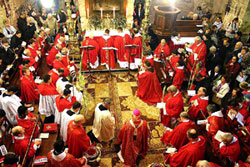 It is celebrated in memory of Jesus` triumphant entry into Jerusalem and the temple where the crowds placed palms at his feet. Holy Week is the final week of Jesus Christ`s life, most tragic yet the most triumphal part of His life. Christians observe it as a week of devout observance, commemorating the Passion and Jesus` death on the cross. Holy Week is a very sacred to the Christians. Christians observe the death and resurrection of Lord Jesus Christ who took away the sins of the world.
It is celebrated in memory of Jesus` triumphant entry into Jerusalem and the temple where the crowds placed palms at his feet. Holy Week is the final week of Jesus Christ`s life, most tragic yet the most triumphal part of His life. Christians observe it as a week of devout observance, commemorating the Passion and Jesus` death on the cross. Holy Week is a very sacred to the Christians. Christians observe the death and resurrection of Lord Jesus Christ who took away the sins of the world.
A mock siege is enacted in memory of this entry and the driving out of the traffickers. Among Syrian Christians it is known as Hosanna or Osanna (meaning: we pray). The observance includes a procession of members of the congregation carrying palms, representing the palm branches and the crowd scattered in front of Jesus as he rode into the city. They sing Hosannas while moving around the church. The liturgy also includes readings recounting the suffering and death of Jesus. The priest distributes the consecrated feast of the tender palm fronds. There are also preparations of sweetmeats of rice flour with coconut kernel inside. Palm Sunday was celebrated in Jerusalem as early as the 4th century and in the West by the 8th century.
Maundy Thursday
On the night of this Thursday, Jesus ate his last supper with his disciples in celebration of the Jewish feast of the Passover. The word "Maundy" originates from the command given by Christ at the Last Supper, that we should love one another. Christians remember `Maundy Thursday" as the day of the Last Supper. It is the day when Jesus washed the feet of all his disciples thereby establishing a ceremony known as the Eucharist. Jesus was betrayed by Judas in the Garden of Gethsemane, on the night of "Maundy Thursday`.
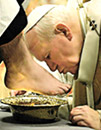
To commemorate this occasion, Roman Catholic Church services conduct a ceremony in which the priest washes the feet of 12 people. Some other churches also have foot-washing ceremonies as part of their Maundy Thursday services. Even the Sacrament of Holy Communion is based on the Last Supper. The Thursday night is spent in prayer and vigil. Mournful verses of Christ`s agony in the garden of Gethsemane are chanted. It is believed that he knew what was coming and in his agony, he sweated drops of blood. Among Syrian Christians, this day is known as Pesaha after Jewish Pesach (Passover).
Good Friday
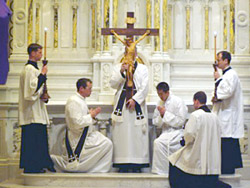 Good Friday is a day of mourning in memory of the Crucifixion. Christ`s suffering and death on the cross is remembered. It marks Jesus` resurrection and falls towards the end of the Holy Week. Initially, it was called God`s Friday. "Good Friday" evolved from "God" or "God`s Friday". Good Friday occurs between the March 20th and April 23rd for the decade (2001 to 2010). At 3 p.m, the time when Jesus is believed to have died on the cross, a ceremony is performed in memory of taking the body from the cross and in some churches ceremonial burial takes place. No bells are rung on this day and a fast is observed.
Good Friday is a day of mourning in memory of the Crucifixion. Christ`s suffering and death on the cross is remembered. It marks Jesus` resurrection and falls towards the end of the Holy Week. Initially, it was called God`s Friday. "Good Friday" evolved from "God" or "God`s Friday". Good Friday occurs between the March 20th and April 23rd for the decade (2001 to 2010). At 3 p.m, the time when Jesus is believed to have died on the cross, a ceremony is performed in memory of taking the body from the cross and in some churches ceremonial burial takes place. No bells are rung on this day and a fast is observed.
Holy Saturday
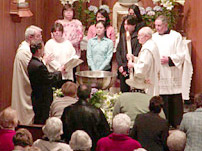 The day of Holy Saturday is also known as Black Saturday. This is a day of silence and prayer, which commemorates the dead Christ in the tomb, however, on this day, no Mass is celebrated. In cases of the danger of death, Eucharistic Hosts remaining from the Liturgies of the two previous days are used as viaticum. Even the Tabernacle is left empty and open and the lamp or candle usually situated next to the Tabernacle denoting the Presence of Christ is put out and the Eucharist is kept elsewhere, usually the sacristy.
The day of Holy Saturday is also known as Black Saturday. This is a day of silence and prayer, which commemorates the dead Christ in the tomb, however, on this day, no Mass is celebrated. In cases of the danger of death, Eucharistic Hosts remaining from the Liturgies of the two previous days are used as viaticum. Even the Tabernacle is left empty and open and the lamp or candle usually situated next to the Tabernacle denoting the Presence of Christ is put out and the Eucharist is kept elsewhere, usually the sacristy.
Easter Sunday
It is the Sunday after Good Friday. In A.D. 325, the church council of Nicaea fixed the date of Easter on the first Sunday following the Paschal full moon. The Pashcal Term (14th or 15th of the month of Nisan in the Jewish calendar) also marks pesach, or Passover. The Paschal Moon is the spring counterpart of the "Harvest Moon". It is the full moon occurring near the autumnal or vernal equinox, 21st March. Therefore, Easter Sunday moves between March 22 and April 25.
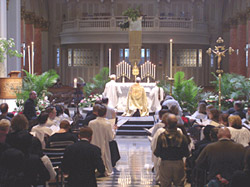 The Resurrection of Christ occurred at the time of the Jewish feast of Passover (called Pesachin Hebrew). The term Easter was first used when the Saxons introduced Christianity. Prior to this time the Saxons had held an annual feast in honour of the ancient Teutonic goddess of spring, Eostre. A month corresponding to April was dedicated to her. The name was transferred to the Christian observance of Christ`s resurrection. The 8th-century English scholar, St. Bede, proposed this. Thus, Easter is at the end of the Lenten season, which covers a 46-day period that begins on Ash Wednesday and ends with Easter. This holy day celebrates the triumph of life over death.
The Resurrection of Christ occurred at the time of the Jewish feast of Passover (called Pesachin Hebrew). The term Easter was first used when the Saxons introduced Christianity. Prior to this time the Saxons had held an annual feast in honour of the ancient Teutonic goddess of spring, Eostre. A month corresponding to April was dedicated to her. The name was transferred to the Christian observance of Christ`s resurrection. The 8th-century English scholar, St. Bede, proposed this. Thus, Easter is at the end of the Lenten season, which covers a 46-day period that begins on Ash Wednesday and ends with Easter. This holy day celebrates the triumph of life over death.
Easter is a joyous and happy day, the world over. Easter rabbit, a symbol of fertility and Easter eggs are with bright colors to represent the sunlight of spring. One of the springtime festivals, Easter represents the true spirit of the season. It expresses rejuvenation, energy and brightness. The celebration of Easter Sunday is the perfect time to enjoy with chocolate bunnies, marshmallow chicks, and colored eggs. Little baskets containing cute chocolate eggs and sweets made of sugared almonds are bought for children. There are prayers and services held in all churches to end the mourning period of lent and to celebrate the holy festival.


